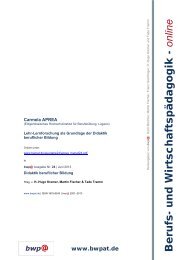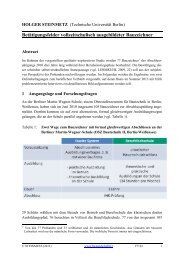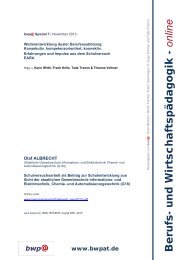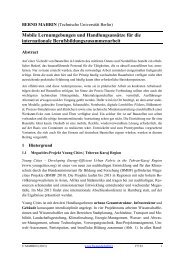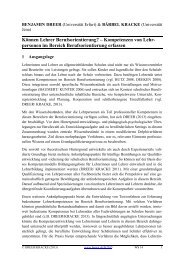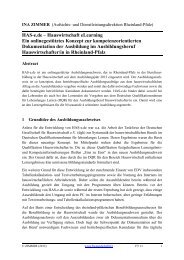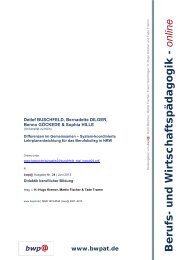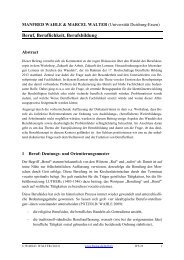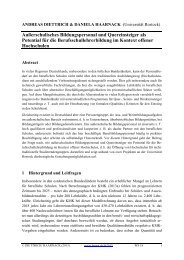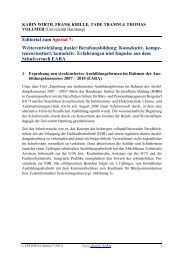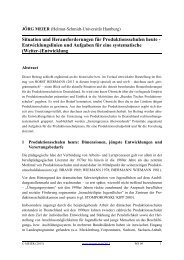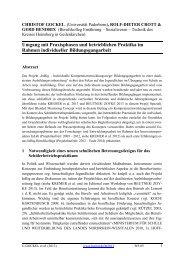Vorlage bwpat-Artikel - bwp@ Berufs- und Wirtschaftspädagogik ...
Vorlage bwpat-Artikel - bwp@ Berufs- und Wirtschaftspädagogik ...
Vorlage bwpat-Artikel - bwp@ Berufs- und Wirtschaftspädagogik ...
Erfolgreiche ePaper selbst erstellen
Machen Sie aus Ihren PDF Publikationen ein blätterbares Flipbook mit unserer einzigartigen Google optimierten e-Paper Software.
ABSTRACT (GASSNER-KEITA 2013 in Ausgabe 25 von <strong>bwp@</strong>)<br />
Online: www.<strong>bwpat</strong>.de/ausgabe25/gassner-keita_<strong>bwpat</strong>25.pdf<br />
Für den Übergang von der Schule in den Beruf eröffnet die Novelle des 2005 reformierten <strong>Berufs</strong>bildungsgesetz<br />
(BBiG) mit § 43 (2) neu geschaffenen Handlungsspielraum. Der Aufsatz beleuchtet dessen<br />
Umsetzung in Nordrhein-Westfalen (NRW) unter dem Aspekt der Verbesserung der Steuerung in<br />
der <strong>Berufs</strong>bildung beim Übergang Schule – Beruf sowie die (Weiter-) Entwicklung der beruflichen<br />
Schulen, den <strong>Berufs</strong>kollegs, in NRW. Die Bildungsadministration Nordrhein-Westfalens hat hierzu<br />
die Rechtsverordnung <strong>Berufs</strong>kolleganrechnungs- <strong>und</strong> -zulassungsverordnung (BKAZVO) erlassen.<br />
Mit Hilfe des Strukturförderprogramms JOBSTARTER wurde deren Umsetzung für dreieinhalb Jahre<br />
durch das Projekt „BK2.NRW“ gefördert. Das betriebliche Ausbildungsangebot wird zum Abbau von<br />
Altbewerberbeständen durch ein für Deutschland unübliches Kombinationsmodell von schulischer<br />
<strong>und</strong> betrieblicher Ausbildung ergänzt. Es kann ein anerkannter Ausbildungsabschluss <strong>und</strong> in der Regel<br />
ein höherwertiger schulischer Abschluss erworben werden. Qualitative Interviews <strong>und</strong> die Auswertung<br />
einer Fachtagung waren die Basis für eine Befragung der Leitungsebene aller die BKAZVO<br />
umsetzenden <strong>Berufs</strong>kollegs (beruflichen Schulen) in Nordrhein-Westfalen. Das Projekt leistet einen<br />
positiven Beitrag für die vielfach gewünschte Zusammenarbeit <strong>und</strong> Kooperation zwischen den beiden<br />
Lernorten Schule <strong>und</strong> Betrieb genauso wie es zur Flexibilisierung <strong>und</strong> Stärkung der (schul-)beruflichen<br />
Ausbildung beiträgt. Es dokumentiert, dass Steuerungs- <strong>und</strong> Kooperationsstrukturen unter unterschiedlichen<br />
regionalen Bedingungen rasch etabliert werden können <strong>und</strong> zur Verbesserung der Ausbildungssituation<br />
in den Regionen beitragen kann.<br />
Implementation of the amendment to the vocational education law at vocational<br />
schools in North Rhine-Westphalia: Innovative scope for the<br />
improvement of governance in vocational education?<br />
The amendment § 43 (2) to the vocational education law which was reformed in 2005 has opened up<br />
new scope for the transition from school into work. This paper sheds light on its implementation in<br />
North Rhine-Westphalia (NRW) with reference to the aspect of the improvement of vocational education<br />
regarding the transition between school and work, as well as the (further) development of vocational<br />
schools and the vocational colleges in NRW. The educational administration of NRW has<br />
issued an ordinance on this issue – the so-called BKAZVO on accreditation and admission regulations<br />
to vocational colleges. With the help of the programme for structural development entitled JOB-<br />
STARTER, its implementation was supported for three and a half years by the project entitled<br />
“BK2.NRW”. In order to reduce the numbers of previously unplaced applicants for training the training<br />
provision in companies is supplemented by a combination model of school-based and companybased<br />
training which is unusual in Germany. A recognised training qualification and generally a high<br />
value school qualification can be attained. Qualitative interviews and the analysis of a conference<br />
formed the basis for a questionnaire of the leadership level of all the vocational colleges (vocational<br />
schools) which implemented BKAZVO in NRW. The project makes a positive contribution to the oftdesired<br />
co-operation between the two learning venues of school and company, as well as to the flexi-<br />
© GASSNER-KEITA (2013) www.<strong>bwpat</strong>.de/ausgabe25/gassner-keita_<strong>bwpat</strong>25.pdf Abstract



